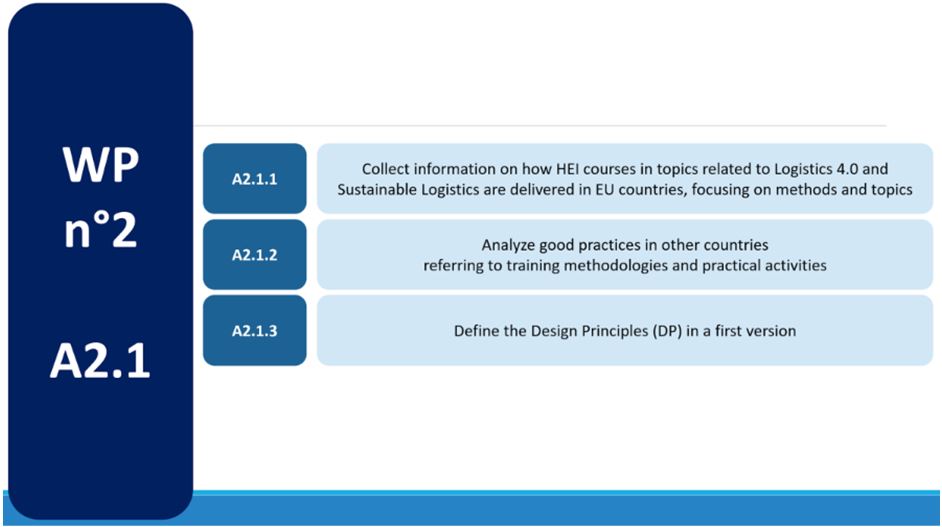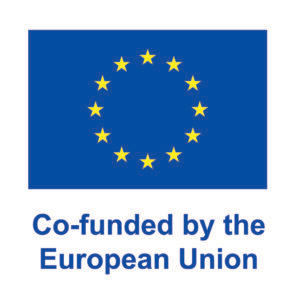SLog4.0
A2.1 STATE-OF-THE-ART OF THE TRAINING IN THE LOGISTICS SECTOR is successfully finished
06/12/2022 University of Maribor
The logistics and transport sectors contribute around 24% of global CO2 emissions. According to a study made by the European Environment Agency, global logistics is expected to account for up to 40% of global CO2 emissions if effective actions are not taken. As stated in the EU Green Deal, logistics creates costs for society, such as emissions of greenhouse gases and pollutants, and the EU aims to reduce green gas emissions from logistics by 90%. Fighting climate change is urgent and the EU is on the front line for reducing human activities impact on the planet. The logistics sector needs to be retaught to contribute to reaching the environmental objectives set up by the European Commission, also included in the EU Green Deal.
Slog4.0 project is aimed at creating a new training course to train the future advanced workforce in the fields of Industry 4.0, Green and Sustainable Logistics. In particular, the training course will focus on the requirements of Industry 4.0 and the concepts of green and sustainable logistics to create a new mindset in HEIs students and provide them with the knowledge and skills needed for making this particular economic sector green and smart.
The partnership for the project is composed of four Universities (Politechnika Poznańska, Poland; Gaziantep Üniversitesi, Turkey; Universidade de Aveiro, Portugal and University of Maribor, Slovenia). Three companies also participated in the project (ValueDo, Italy; ECQA, Austria and ZERYNTH, Italy)
The first step to this ambitious goal was defining state-of-the-art of training in the Logistics sector (A.2.1). With this activity, university partners collected information on:
- how HEI courses in topics related to Logistics 4.0 and Sustainable Logistics are delivered in EU countries, focusing on methods and topics, and
- good practices in non-EU countries referring to training methodologies and practical activities. The collected data enabled the partners to define the Course Design Principles in the first version. Duration of this activity was three months, from September 2022 to November 2022.

During the review of HEIs courses in EU and non-EU, university partners noticed that certain contents are often present in curricula, especially between other topics of basic knowledge of logistics. Topics from sustainability are not something exotic but are often present in the curricula of both EU and non-EU HEIs, mainly in the form of independent subjects in the bachelor-level degree. Integrating sustainability as a way of thinking into the entire study program is rarer. Subjects on sustainability are often performed as teacher-centered.
Greater progress in the way sustainability topics are included can be seen in master's programs. This is very likely possible because undergraduate programs introduce participants to the basics of concepts. At the masters' study programs, partners identified good practices in connection with the content of the courses, learning and teaching methods, and innovative approaches since the students are able to work more independently and on real cases.
Partners noticed a small share of courses that include advanced student-centered approaches such as project work, problem-based learning, flipped classrooms, and simulations. As good practices, partners noticed group assignments, the use of case studies, and the use of gamification, although they expected to find more. There is minimal duplication of content between HEIs. Even if the content looks similar, it is a completely different aspect of dealing with it.
Since the beginning of the first activities, all partners, led by UM, kept into account the different perspectives and the different levels of technological development, defining some issues that require an active EU collaboration:
- Current courses do not meet the future needs of the companies that go in the direction of more digital and green processes for logistics companies;
- 0 and green skills are both relevant, but the knowledge transfer internal to the HEIs and among HEIs and companies to include them both into training curricula is not usually smooth;
- Logistics education at a specific HEI is more or less tailored to the needs of companies and organizations from the home country and the region, while logistics is global and requires a globally coordinated development.
Starting from the state of the art of training offered in the EU in the field of logistics (specifically digital and green skills) the partners guaranteed a scientific research activity. Thanks to their expertise and after having conducted a robust training need analysis, partners elaborated a holistic training path, keeping together knowledge and skills referring to the digital and green dimensions. Also, the training course will encompass practical learning and exercises based on the solutions to real company problems. EU cooperation is also essential for mainstreaming the project results and transferring them to a broader audience.
Thanks to the activities carried on in A2.1 state-of-the-art of the training in the logistics sector, the partners can now identify which are in detail the set of knowledge, skills, and competencies that the students need in order to significantly contribute to "greening" and digitalization of the logistics sector and become more employable. The results and objectives of A2.1 have been reached and officially validated by the whole consortium.


